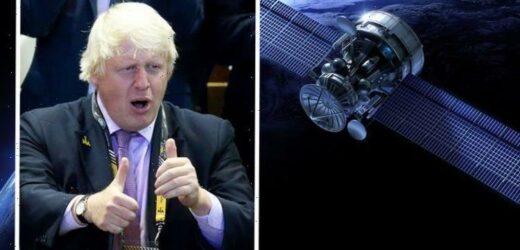Galileo: David Morris outlines UK’s role in project
We use your sign-up to provide content in ways you’ve consented to and to improve our understanding of you. This may include adverts from us and 3rd parties based on our understanding. You can unsubscribe at any time. More info
OneWeb, the Government-backed satellite operator plans to spend the money moving its operations from the US to the UK. Chris McLaughlin, OneWeb’s head of Government affairs, told MPs that it would start work next year on a UK manufacturing programme before starting to build satellites by 2025. It will be the UK’s biggest space project since Brexit and could result in OneWeb splitting from Airbus, its existing manufacturing partner.
Mr McLaughlin told MPs on the Commons science and technology committee that OneWeb would build the second generation of its satellites in Britain.
He said: “By 2024-25 we will be building in the UK.”
It comes after Kymeta and OneWeb announced a joint development agreement (JDA).
They will develop an innovative flat-panel electronically steered user terminal together. It will support land fixed applications and lead the way to various mobility applications like land mobile, maritime, and other mobility needs of the future.


It is understood that the technology will help provide precise navigation which could be used by the military, as well as other applications.
The UK was kicked out of the EU’s Global Navigation Satellite System (GNSS) when it left the bloc.
The system, which goes live in 2026, features a Public Regulated Service (PRS) that can be used by government agencies, armed forces and emergency services.
The bloc decided this “crucial feature” would only be accessible for EU members, despite the UK developing its “brains and heart”.
The Government appeared to give up on the dream of building a UK alternative when it invested £364million ($500million) to acquire the satellite company OneWeb from bankruptcy, in conjunction with the Indian company Bharti Global.
READ MORE: Archaeology breakthrough as evidence of Roman crucifixion found in British housing estate
/news/science/1533550/archaeology-breakthrough-roman-crucifixion-found-fenstanton-bible-news-jesus-christ

OneWeb was designed as a broadband constellation first and foremost – it will provide rural 4G, and one day 5G, Internet signals across the nation.
It will operate in LEO, as opposed to the medium Earth orbits used by Galileo and GPS.
But Kymeta’s system is designed to work with OneWeb’s LEO network as well as other satellite networks that make use of constellations in geosynchronous orbits.
OneWeb is working with a portfolio of companies, including Hanwha, which recently invested £200million in the operator.
DON’T MISS:
Priti Patel extends deadline for asylum applications [REVEAL]
Inmates take swift revenge on tragic Arthur’s ‘evil’ stepmother [INSIGHT]
Covid: Boris can’t impose ANY more lockdowns after party [LIVE]


Hanwha made the investment via Hanwha Systems, the defence systems division that last year acquired Phasor Solutions, a British satellite antenna start-up.
The group will have a seat on OneWeb’s board.
Britain is seen as a global leader in small satellites, with bases in Glasgow and the south of England, but the industry was hit by moves to move work on the EU’s system.
OneWeb plans to have a network of 588 satellites in space by the middle of next year.
It is working with BT on a potential satellite Internet service in the UK, and is currently testing its services in Alaska.
Source: Read Full Article


